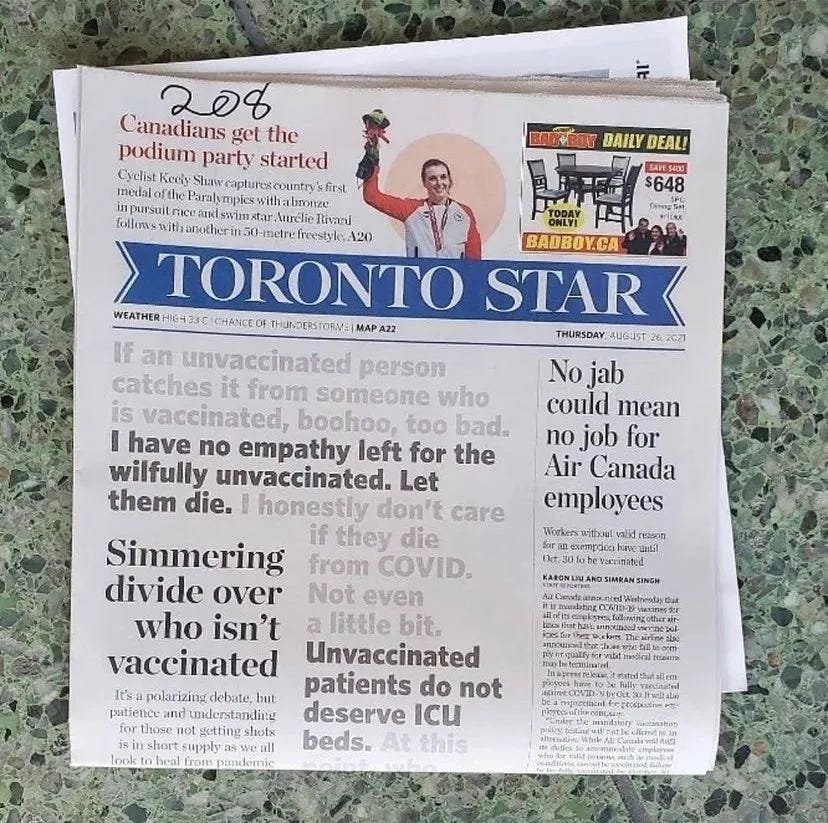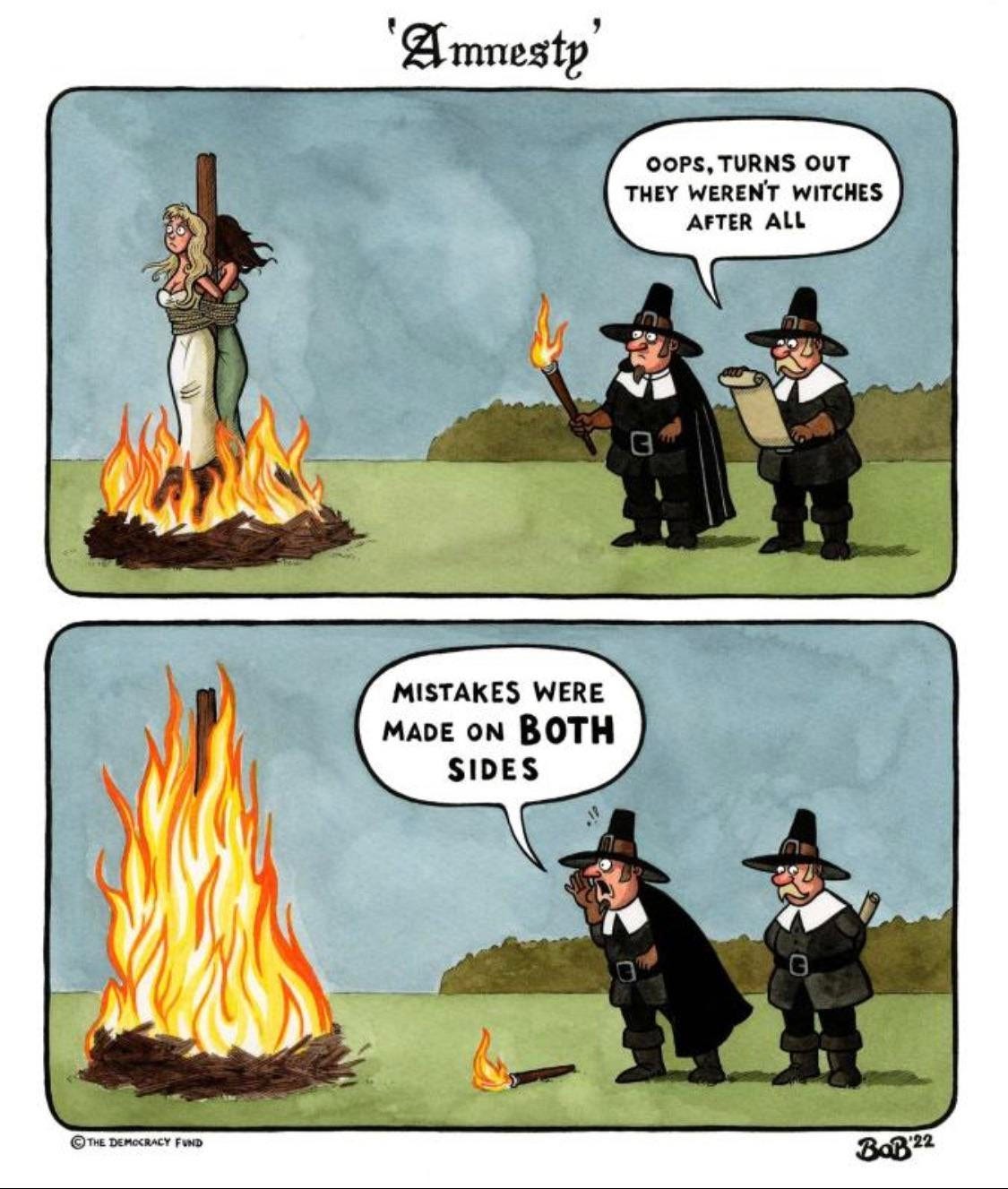Welcome to Barstool Bits, a weekly short column meant to supplement the long-form essays that appear only two or three times a month from analogy magazine proper. You can opt out of Barstool Bits by clicking on Unsubscribe at the bottom of your email and toggling off this series. If, on the other hand, you’d like to read past Bits, click here.

The post-covid apology genre was catalysed into being October 31, 2022 by Emily Oster’s article for the Atlantic, “Let’s Declare a Pandemic Amnesty: Let’s focus on the future and fix the problems we still need to solve.” Oster’s claim was that “We didn’t know”: that covid wasn’t quite as bad as the flu, that lockdowns caused more harm than good, that masks didn’t work; and by extension, we didn’t know that all the human rights violations were wrong.
Of course “we” knew. There was a reason we’d never locked down before. Check out the Great Barrington Declaration; and recall Fauci’s initial messaging about masks not working? That was based on what we did know. In fact, back in 2003, during the first SARS craze, Australia threatened to fine businesses up to $110,000 for trying to market masks by exaggerating health benefits. I plan on doing a deep dive on the We Didn’t Know claim for analogy within the next month or two, but here, I’d like to focus humorously on this apology genre that emerged after Oster’s refusal to apologise.
Oster’s point was that those who somehow did know better should back off because those who decided to drop all ethical standards and become barbarians didn’t know. Of course, her rhetoric is more clever than that, but that’s what it amounts to.
Sobering to realise that most don’t understand that ethical standards are there for times of crisis, not for when times are good and things are going well. We generally don’t need human rights codes and codes of moral conduct for when things are running smoothly. We don’t need ethics for when it’s easy to be a good person; we need them for when it’s hard to be a good person—when hard choices stand before us. We were all raised to know good from bad.
But at the first sign of trouble, far too many dropped all moral considerations, trampled on the social contract, replaced their masks of kindness with false masks of covid virtue, started snitching on neighbours, hid under their beds like a bunch of cowards and called those who refused to behave this way, “selfish cowards.”
In many cases, the true-believer branch covidians called for death of the “unvaccinated.” Jimmy Kimmel announced that they ought to be refused medical care—which by the way they were and still are! (Let’s keep in mind that doctors are trained to treat enemy combatants on the battle field. A medic or doctor will go out of his way to save the life of someone who was about to murder him!) Arnold Schwarzenegger told Americans, “screw your freedom.” Provincial health officer of British Columbia, Bonnie Henry, told news media that “she doesn't have any time for those who think wearing a mask makes them ill, or is a limitation of their personal freedom.” She seemed to be entirely unaware of the H1N1 work done on masking in 2009 in which health care workers were made to wear masks all day. Not only were they ineffective, but “Their complaints included diminished speech communication, heat, pressure, and dizziness.”
And then Canada’s dictator, Justin Trudeau, spoke of those who refused to take a rushed vaccine blindly and without data on potential harms from side effects, saying they “don’t believe in science,” and calling them “often mysogynists, and often racists,” saying, “it’s a little group that takes up space” and asking the public, “Do we tolerate those people?”
At the end of January 2022, he further smeared “those people” as “a small fringe minority” who hold “unacceptable views.” This statement was aimed at the Trucker’s Freedom Convoy just getting underway in Ottawa. Trudeau’s dismissive and out-of-touch insults launched the world’s biggest backlash against covid lockdowns and mandates. Supporters lined bridges and roadsides to greet the truckers rolling across Canada. And Trudeau’s reaction, when shown that this was no “fringe,” was to refuse meeting with the representatives of the movement, and instead to quash the protests by invoking dictatorial powers meant to be implemented in times of war against a foreign enemy, but which he deployed against Canadian citizens who were conducting a peaceful (though often loud) protest. He brought to bear brutal policing tactics and bank account seizures, turning Canada into his own People’s Republique da Canadia overnight.
And let’s not forget Trudeau’s segregationist statements the previous summer, in August of 2021, when he was campaigning for reelection. Regarding the unvaccinated, he claimed they were
putting at risk their own kids and our kids. . .You want to get on a plane or a train in the coming months, you’re going to have to be fully vaccinated, so that families with their kids don’t have to worry that someone is going to put them in danger in the seat next to them or across the isle. And we know that the way to get through this as well is to make sure that people can go into non-essential businesses and feel safe that they’re not going to get covid from someone next to them. . .And those people are putting us all at risk. - Justin Trudeau
Don’t tell me Trudeau “didn’t know” these statements were perpetuating urban myths predicated on lies. His emphasis on harm to children was cynical politicking designed to polarise public opinion. Don’t tell me Trudeau didn’t know that we did know that covid wasn’t affecting kids. And by the way “we” did know that the so-called vaccines weren’t preventing virus transmission either. And to top it off, don’t tell me Trudeau didn’t know that the phrase “those people” is morally reprehensible, especially coming from the mouth of a prime minister.
But once the panic was over, these scoundrels wanted amnesty. . . because they didn’t know better? Hmm.
The reaction to this ridiculous situation has been humorous, sometimes sardonically so—as some of the memes included in this article attest to.
Following the call for amnesty, there were a couple of genuine apologies like this one from Dr. Kevin Bass and this one from town councillor Anne Tessier, and I saw a couple others on Twitter. But for the most part, I was seeing faux apologies from some upstanding individuals who’d been treated like pariahs by neighbours, friends and family and were frustrated at their stubborn refusal to apologise or even acknowledge immoral behaviour.
What got me thinking about the emergent genre was an article from Naomi Wolf called “Dear Conservatives, I Apologize: My Team Was Taken in By Full-Spectrum Propaganda.” She wasn’t apologising for covid panic, though, because she’d been on top of that issue. Instead it was an apology for getting the January 6 riot at the Capitol story wrong.
Anyway, all this got me thinking about the poet William Carlos Williams (1883-1963) and his famous poem, “This is Just to Say”:
I have eaten the plums that were in the icebox and which you were probably saving for breakfast Forgive me they were delicious so sweet and so cold
The appeal to be forgiven here is amusing because it’s not genuine. The deed is done and there’s nothing one can do about it. So it comes off as a tease, emphasising the lost pleasure: mmm-mm, those marvellous plums you never got to taste!
Noting the irony of the piece, poet Kenneth Koch (1925-2002) initiated a tradition of parodying “This is Just to Say” with his 1962 poem, “Variations on a Theme by William Carlos Williams.” Given the present context, variation #2 stands out:
1
I chopped down the house that you had been saving to live in next
summer.
I am sorry, but it was morning, and I had nothing to do
and its wooden beams were so inviting.
2
We laughed at the hollyhocks together
and then I sprayed them with lye.
Forgive me. I simply do not know what I am doing.
3
I gave away the money that you had been saving to live on for the next ten
years.
The man who asked for it was shabby
and the firm March wind on the porch was so juicy and cold.
4
Last evening we went dancing and I broke your leg.
Forgive me. I was clumsy, and
I wanted you here in the wards, where I am the doctor!Further parodies have since been written by just about everyone, including school children. This article is great and includes an extraordinary piece by a sixth-grader:
This is Just to Say...
Sorry I took your money and burned it,
but it looked like the world falling apart
when it crackled and burned.
So I think it was worth it.
After all, you can't see the world fall apart every day.My barstool offering goes as follows:
This is Just to Say 2020-2023
by Kim Jong Castreau
We made you wear
face diapers
and locked down
the world;
made your pay
contingent on
taking a syringe
of our kool-aid
that we knew
didn’t stop
the spread
of disease;
and we
came after you
on horseback
when you refused.
We were in a panic.
And you made
such an easy
target.All this to say, don’t hold your breath for an apology. Those who panicked and ditched all semblance of moral rectitude and gaslit and came after the unvaxxed with pitchforks and torches and unhinged rhetoric and calls for their imprisonment and death will never apologise. Why? Because no one wants to see themselves as ugly and evil. I wrote about that in this barstool bit. They’d rather avoid the topic completely or make the lame excuse that they didn’t know. “Let’s just move on,” they want to say.
Those of us who wrote to human rights lawyers, politicians and various institutions and signed every petition available to sound alarm bells about things like the deadly history of rushed vaccines, the Nazi politicisation of typhus to segregate and round up infectious Jews, and the 1947 Nuremberg Code (regarding informed consent and coercion when it comes to experimental pharmaceuticals) only to be met with a wave of the hand and in some cases even scorn and accusations of promoting conspiracy theory. . . those folks who suffered at the hands of immoral segregationists who refused to uphold basic ethical standards even when it was their duty to do so (by oaths of office and medical oaths) want accountability; we want apologies. But think about it: if any politician or medical authority actually apologised, that would not only end their career, it would open them up to litigation and imprisonment. Unless compelled by a court, those apologies will never happen.
Asa Boxer’s poetry has garnered several prizes and is included in various anthologies around the world. His books are The Mechanical Bird (Signal, 2007), Skullduggery (Signal, 2011), Friar Biard’s Primer to the New World (Frog Hollow Press, 2013), Etymologies(Anstruther Press, 2016), Field Notes from the Undead (Interludes Press, 2018), and The Narrow Cabinet: A Zombie Chronicle (Guernica, 2022). Boxer is also a founder of and editor at analogy magazine.








Those weren't 'mistakes'. Every new overreach by government regulators (and teachers' union et al) was met with good arguments against the policies and warnings of their dire results.
Mistakes call for apologies, at least. Wanton malfeasance calls for a different reaction.
I like the word 'specious'.
Last century, Lenin used specious arguments to convince his "useful idiots" to promote his brand of Marxism. Result: mass murder.
Today, by 'owning' their employers, the medical-industrial-political complex does something similar with its 'useful idiots' (we call them 'journalists'). Result: mass murder.